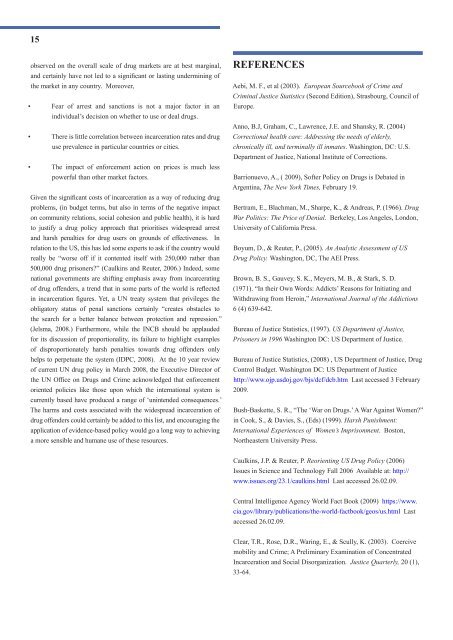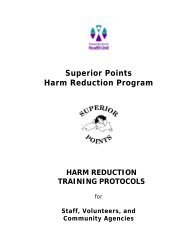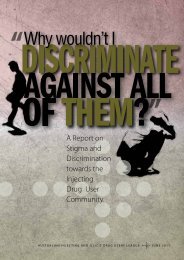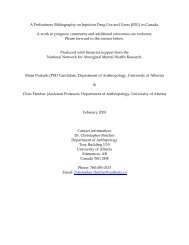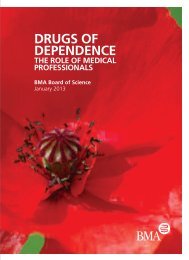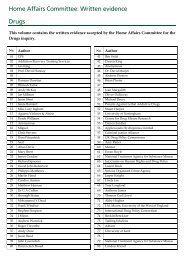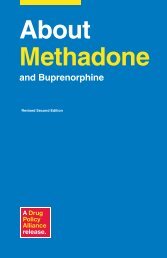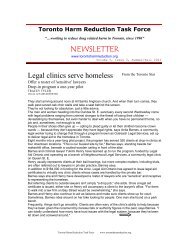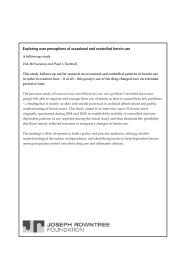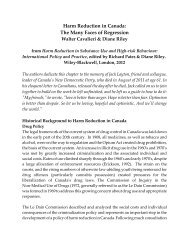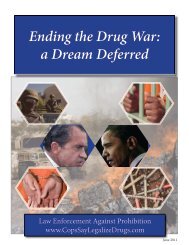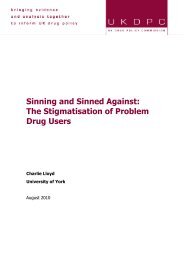The Incarceration of Drug Offenders - The Beckley Foundation
The Incarceration of Drug Offenders - The Beckley Foundation
The Incarceration of Drug Offenders - The Beckley Foundation
- No tags were found...
You also want an ePaper? Increase the reach of your titles
YUMPU automatically turns print PDFs into web optimized ePapers that Google loves.
15observed on the overall scale <strong>of</strong> drug markets are at best marginal,and certainly have not led to a significant or lasting undermining <strong>of</strong>the market in any country. Moreover,• Fear <strong>of</strong> arrest and sanctions is not a major factor in anindividual’s decision on whether to use or deal drugs.• <strong>The</strong>re is little correlation between incarceration rates and druguse prevalence in particular countries or cities.• <strong>The</strong> impact <strong>of</strong> enforcement action on prices is much lesspowerful than other market factors.Given the significant costs <strong>of</strong> incarceration as a way <strong>of</strong> reducing drugproblems, (in budget terms, but also in terms <strong>of</strong> the negative impacton community relations, social cohesion and public health), it is hardto justify a drug policy approach that prioritises widespread arrestand harsh penalties for drug users on grounds <strong>of</strong> effectiveness. Inrelation to the US, this has led some experts to ask if the country wouldreally be “worse <strong>of</strong>f if it contented itself with 250,000 rather than500,000 drug prisoners?” (Caulkins and Reuter, 2006.) Indeed, somenational governments are shifting emphasis away from incarcerating<strong>of</strong> drug <strong>of</strong>fenders, a trend that in some parts <strong>of</strong> the world is reflectedin incarceration figures. Yet, a UN treaty system that privileges theobligatory status <strong>of</strong> penal sanctions certainly “creates obstacles tothe search for a better balance between protection and repression.”(Jelsma, 2008.) Furthermore, while the INCB should be applaudedfor its discussion <strong>of</strong> proportionality, its failure to highlight examples<strong>of</strong> disproportionately harsh penalties towards drug <strong>of</strong>fenders onlyhelps to perpetuate the system (IDPC, 2008). At the 10 year review<strong>of</strong> current UN drug policy in March 2008, the Executive Director <strong>of</strong>the UN Office on <strong>Drug</strong>s and Crime acknowledged that enforcementoriented policies like those upon which the international system iscurrently based have produced a range <strong>of</strong> ‘unintended consequences.’<strong>The</strong> harms and costs associated with the widespread incarceration <strong>of</strong>drug <strong>of</strong>fenders could certainly be added to this list, and encouraging theapplication <strong>of</strong> evidence-based policy would go a long way to achievinga more sensible and humane use <strong>of</strong> these resources.REFERENCESAebi, M. F., et al (2003). European Sourcebook <strong>of</strong> Crime andCriminal Justice Statistics (Second Edition), Strasbourg, Council <strong>of</strong>Europe.Anno, B.J, Graham, C., Lawrence, J.E. and Shansky, R. (2004)Correctional health care: Addressing the needs <strong>of</strong> elderly,chronically ill, and terminally ill inmates. Washington, DC: U.S.Department <strong>of</strong> Justice, National Institute <strong>of</strong> Corrections.Barrionuevo, A., ( 2009), S<strong>of</strong>ter Policy on <strong>Drug</strong>s is Debated inArgentina, <strong>The</strong> New York Times, February 19.Bertram, E., Blachman, M., Sharpe, K., & Andreas, P. (1966). <strong>Drug</strong>War Politics: <strong>The</strong> Price <strong>of</strong> Denial. Berkeley, Los Angeles, London,University <strong>of</strong> California Press.Boyum, D., & Reuter, P., (2005). An Analytic Assessment <strong>of</strong> US<strong>Drug</strong> Policy. Washington, DC, <strong>The</strong> AEI Press.Brown, B. S., Gauvey, S. K., Meyers, M. B., & Stark, S. D.(1971). “In their Own Words: Addicts’ Reasons for Initiating andWithdrawing from Heroin,” International Journal <strong>of</strong> the Addictions6 (4) 639-642.Bureau <strong>of</strong> Justice Statistics, (1997). US Department <strong>of</strong> Justice,Prisoners in 1996 Washington DC: US Department <strong>of</strong> Justice.Bureau <strong>of</strong> Justice Statistics, (2008) , US Department <strong>of</strong> Justice, <strong>Drug</strong>Control Budget. Washington DC: US Department <strong>of</strong> Justicehttp://www.ojp.usdoj.gov/bjs/dcf/dcb.htm Last accessed 3 February2009.Bush-Baskette, S. R., “<strong>The</strong> ‘War on <strong>Drug</strong>s.’ A War Against Women?”in Cook, S., & Davies, S., (Eds) (1999). Harsh Punishment:International Experiences <strong>of</strong> Women’s Imprisonment. Boston,Northeastern University Press.Caulkins, J.P. & Reuter, P. Reorienting US <strong>Drug</strong> Policy (2006)Issues in Science and Technology Fall 2006 Available at: http://www.issues.org/23.1/caulkins.html Last accessed 26.02.09.Central Intelligence Agency World Fact Book (2009) https://www.cia.gov/library/publications/the-world-factbook/geos/us.html Lastaccessed 26.02.09.Clear, T.R., Rose, D.R., Waring, E., & Scully, K. (2003). Coercivemobility and Crime; A Preliminary Examination <strong>of</strong> Concentrated<strong>Incarceration</strong> and Social Disorganization. Justice Quarterly, 20 (1),33-64.


